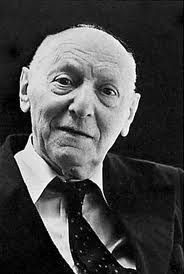"Disguised" by Issac Bashevis Singer (1986-heard on The New Yorker podcast-24 minutes)
I have said several times that one of the great "side benefits" of short stories is that they can give you an entree into the work of a new writer. "Disguised" by Issac Singer did not just introduce a new to me writer, it opened up what seems to be a vast new area of literature that is also largely new to me, Yiddish literature. Yiddish (my information here comes from some quick research on Yiddish in Wikipedia) Yiddish is a language that was developed in the middle ages in Jewish Communities along the Rhine river in Germany. From the Rhineland it spread to central and eastern Europe. It is a mixture of German, Hebrew, Aramaic, and Slavic languages and is written in Hebrew. It was the language of many of the victims of the Holocaust and of Russian progroms.
Issac Singer (1902-1901-born Poland) won the Nobel Prize in 1986 for the full body of his work. He is best known to the public as the author of Yentil, the basis for a very popular movie. There is a good article on his life and work here. Singer's, even though he left Poland in 1935 because of the rise of the Nazis, work is very rooted in the culture in which he was raised. He became an American citizen. Singer died and is buried in Florida. Singer was very into the reading life. He indicated his biggest influences as a short story writer were Anton Chekhov and Guy de Maupasssant.
"Disguised" was originally published in The New Yorker. As the story is not in the public domain, I am thankful to the magazine for including it among its pod casts. (I will include link to this at the end of the post.) It is perfectly read by Nathan Englander.
"Disguised" is set in Poland, circa 1925 or so. As the story opens we are at the wedding of a young couple. It was, as was the custom, an arranged wedding and the groom was paid a dowry. Along the way I learned some of the cultural background about weddings and marriages. This is a very powerful almost shocking story. All seems to be going more or less normal in the marriage and then one night the groom simply leaves. He leaves behind almost all the dowry money. He disappeared in the night. He was living in the home of his bride. Everyone is very much shocked by this. The bride, from a comfortable very traditional family, is quizzed by the other women in the family about the marriage. Things are left a little vague. It appears the bride was not given any information about the physical relationship involved in marriage. We are left not really knowing what the problem might be.
Against her parents wishes the bridge goes in search of him. She begins to be exposed to aspects of life she never knew about. She is exposed to a world outside the very sheltered home of her parents. She encounters the poor. She must learn to speak up for herself. We can feel her gaining wisdom and maturity as she travels. Everywhere she goes she asks if anyone has seen her husband. To make matters worse for her, she cannot remarry unless he grants her a divorce. She begins to fear maybe he has left Poland for America. Then one day behind her comes the sound of her husband's voice, ordering some vegetables in the market. When she whirls around she sees someone dressed as a woman, but with some peach fuzz on her face. The person at first insists he is not her missing husband then he breaks down and admits that yes he is her husband. The shocked woman demands to know why in violation of custom, he is dressed as a woman. She wants to know for whom he is buying the vegetables.
I will not tell more of the plot. Maybe as the end approaches you could see it coming but at the start and middle we cannot.
I highly recommend "Disguised". There is a good before and after discussion on the pod cast. Lovers of the short story owe a deep debt of gratitude to The New Yorker. Singer published a lot of stories in the magazine but I think only subscribers can read them online.
As always I am looking for suggestions for short stories.
Mel u
Listen or download here
Subscribe to:
Post Comments (Atom)
Featured Post
Imperial Reckoning: The Untold Story of Britain’s Gulag in Kenya by Caroline Elkins - 2005 - 701 Pages
Imperial Reckoning: The Untold Story of Britain’s Gulag in Kenya by Caroline Elkins - 2005 - 701 Pages 2006 Pulitzer Prize Winner From...
-
Buriedinprint.com This year, Buried in Print, a marvelous blog I have followed for over ten years,is doing a read through of the short sto...
-
My Posts on the literature and history of the Philippines Francisco Arcellana (1916 to 2002) was a highly regarded poet, essayist, crit...
-
Nothing Can Destroy the Faith and Strength of the people of the Philippines - Mel u, Quezon City and Candelaria, November 10, 2013- commen...





1 comment:
Thanks you for talking about this story and thank you for posting the link to this story. It was a really great short story and I was glad to listen to the new yorker podcast of it. This was a great way to learn about a new author.
Post a Comment